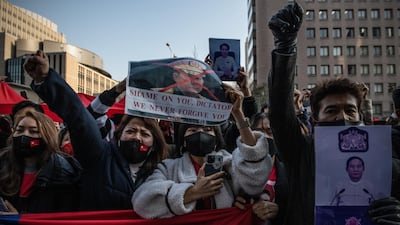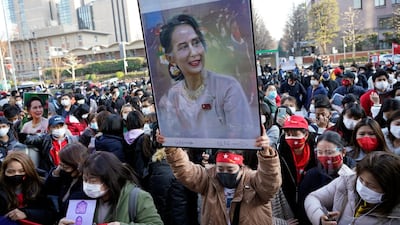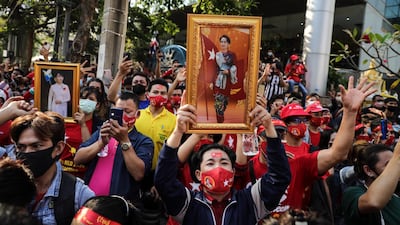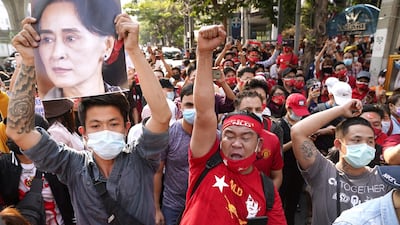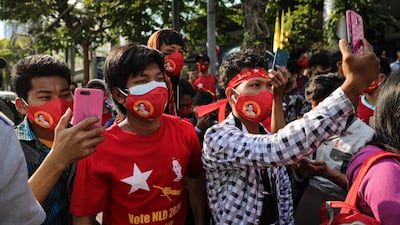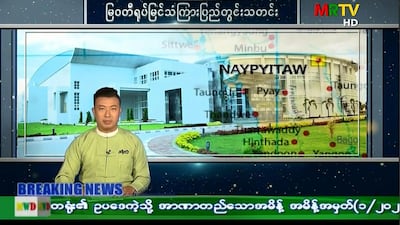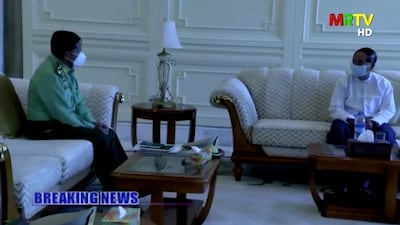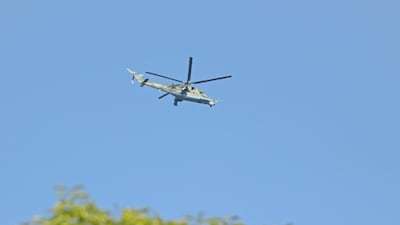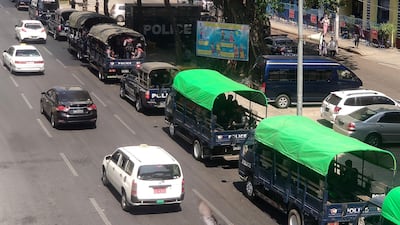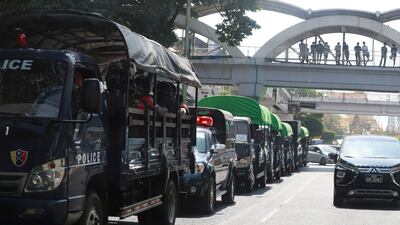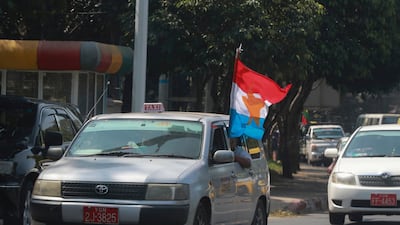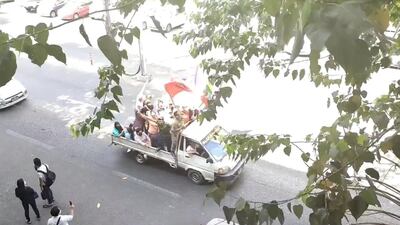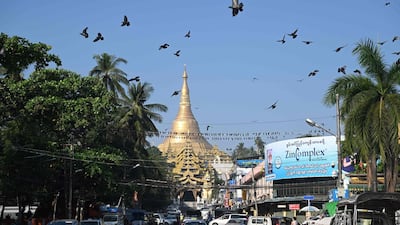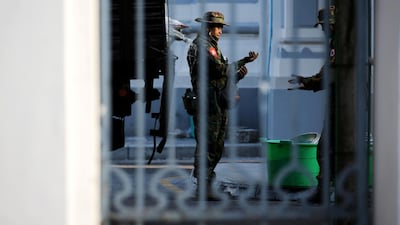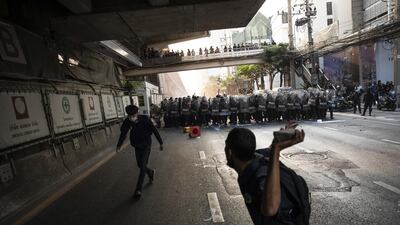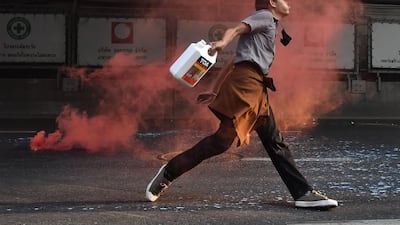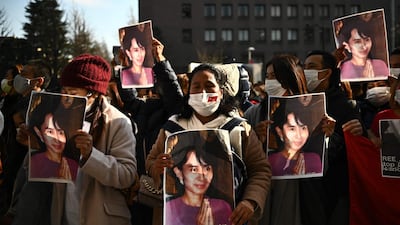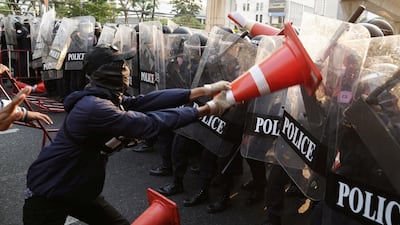Myanmar’s military seized control and will run the country for a year before holding new elections after rounding up the country’s civilian government – including the disgraced long-time democratic activist-turned national leader Aung San Suu Kyi.
The military claimed widespread violations to November’s elections and criticised the government for holding the vote during the Covid-19 pandemic. The army leadership demanded explanations but took back control of the country after accusing civilian leaders of a reluctance to discuss the concerns.
The coup comes five years after Ms Suu Kyi swept elections against a military-backed party – only the second vote held since the junta took power in 1962 – and led a civilian administration intent on charting a course towards democracy.
Supporters of Myanmar’s military and the political party it backs held small rallies on Monday to celebrate the ousting of Ms Suu Kyi’s National League for Democracy government.
Pickup trucks carrying about half a dozen people each cruised in small swarms through the main streets of Yangon, the country’s biggest city. Some vehicles had loudspeakers blaring music and most carried the national flag. Some also displayed Buddhist flags.
As international criticism of the move mounted, the army cited the military-drafted constitution that allows armed forces to intervene in times of national emergency as the reason for its actions on Monday.
The talk of a possible coup had been mounting for days ahead of the new session of Parliament scheduled on Monday.
Then early on Monday, senior politicians – including State Counsellor Ms Suu Kyi, the de-facto head of government, and President Win Myint – were detained in raids on their homes before phone and internet services in the capital city of Naypyitaw were cut.
All international flights were suspended, the US embassy Facebook page reported while the roads to the international airport in Yangon, the country's biggest city, were closed.
The Irrawaddy, an online news service, reported that as well as Ms Suu Kyi and Mr Myint, their NLD executive committee members, MPs and regional cabinet members were all detained.
"The actions of the military are actions to put the country back under a dictatorship, I urge people not to accept this, to respond and wholeheartedly to protest against the coup by the military," Ms Suu Kyi said in a statement released by her NLD party chairman Win Htein.
At the bottom of the typed statement was a handwritten postscript attesting to its authenticity and that it reflected Ms Suu Kyi’s wishes.
“On my life, I swear that this request to the people is Aung San Suu Kyi’s genuine statement,” wrote Mr Win Htein.
Mr Win Htein said the coup was because of the personal ambitions of Senior General Min Aung Hlaing, commander-in-chief of the armed forces.
"The country's economy is going down. At this time, the fact that he conducted a coup shows that he doesn't think about the future."
Local and international reaction to coup
The US, Australia, UK and other countries expressed concern and urged Myanmar's military to respect the rule of law.
“The United States is alarmed by reports that the Burmese military has taken steps to undermine the country’s democratic transition, including the arrest of State Counsellor Aung San Suu Kyi and other civilian officials in Burma,” White House spokeswoman Jen Psaki said using the former name of Myanmar.
She said President Joe Biden had been briefed on developments.
US Secretary of State Antony Blinken echoed the White House statement and said the military “must reverse these actions immediately”.
"We call on Burmese military leaders to release all government officials and civil society leaders and respect the will of the people of Burma as expressed in democratic elections on November 8," he said.
British Prime Minister Boris Johnson condemned "the coup and unlawful imprisonment of civilians".
"The vote of the people must be respected and civilian leaders released," he said on Twitter.
Australian Foreign Minister Marise Payne called for the release of Ms Suu Kyi and others.
UN Secretary General Antonio Guterres urged the military "to respect the will of the people".
Canada's ambassador to the UN tweeted that Myanmar's military "wrote the constitution this way so they could do this. The constitution of 2008 was specifically designed to ensure military power was deeply entrenched and protected."
The EU Council head Charles Michel also condemned the military's seizure of power.
Dil Mohammed, the leader of the Rohingya ethnic group that has faced mass killing and ethnic cleansing under Ms Suu Kyi, spoke out against the military takeover,
“We Rohingya community strongly condemn this heinous attempt to kill democracy. We urge the global community to come forward and restore democracy at any cost."
Regional reactions, however, were mixed.
Although urging restraint, the leaders in Thailand, Cambodia, Indonesia and the Philippines, called the military takeover an internal matter.
China, Myanmar's largest trading partner, said it had "noted" the military coup in Myanmar and “hopes … the various parties in Myanmar will appropriately resolve their differences under the constitutional and legal framework to protect political and social stability".
Bangladesh, another neighbour, called for peace and stability in Myanmar. It said it hoped its neighbour would make genuine efforts to move forward the stalled process of voluntary repatriation of Rohingya Muslim refugees from Bangladesh.
World leaders were not the only ones to express concern over the coup. Access Now a group that works to defend digital rights called the shutdown of internet services to prevent a democratic transition "unacceptable" and call on authorities, "to restore uninterrupted connectivity in the country and to all people, no matter their political beliefs.”

What caused the coup now?
Ms Suu Kyi spent 15 years under house arrest for being a threat to peace and stability before being released in 2010. She became a member of parliament in 2012, and three years later, her NLD swept the national elections and she was made State Counsellor – a role created as she was barred from becoming president because her late husband and children had foreign nationality.
The military holds 25 per cent of the total seats in parliament under the 2008 military-drafted constitution and several key ministerial positions are also reserved for military appointees. Relations between the army and civilian leaders has long been strained.
But MPs were due to meet on Monday for the first session of Parliament since last year’s election that again confirmed Ms Suu Kyi as the country’s most dominant civilian politician.
Her party won 396 out of 476 seats in the combined lower and upper houses of Parliament in the November polls.

But, according to one analyst, Monday’s coup could mean the end of Ms Suu Kyi's political career.
“There is little future for her, I believe in this point in time, and I do think that is what the military want most,” said analyst Larry Jagan. "They do not trust her, they do not like her, and they do not want her to be part of the country’s future.
"Therefore, getting rid of her or cutting her out of the process really is a very important part of their game plan.”
